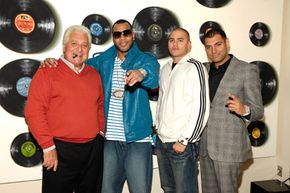Being an entertainment lawyer may seem like a glamorous career that offers a way to rub shoulders with celebrities and up-and-coming artists. While that may be true for some successful lawyers, entertainment law is a demanding career that requires a firm grounding in legal areas like contract law, labor law, litigation and intellectual property, as well as extensive knowledge of how the entertainment industry works. Bear in mind, too, that plenty of would-be entertainment attorneys are jockeying for a limited number of jobs in the industry.
Entertainment lawyers provide legal help for artists, employees, companies and individuals involved in all areas of the entertainment industry, including film, radio, television, music, publishing, theater and digital or multimedia entertainment like video games.
This could mean helping an actor negotiate a contract with a studio, filing suit over a pirated film, ensuring that stuntmen have adequate medical coverage, overcoming an impasse in union contract negotiations, assisting a young recording artist with financial or real estate decisions, protecting a recording star from illegal use of a copyrighted song or even preventing invasion of a client's privacy [source: Lawyers.com].
Here's a list of activities that might be part of an entertainment lawyer's job description:
- Draft contracts for a client, review contracts from managers, publicists, record labels, film studios and others to make sure they're legal and fair to the client and then negotiate those contracts.
- Maintain relationships with studios or record labels and be aware of who's influential and what deals are being made in the industry. Having strong contacts can help a lawyer get a deal done quickly, while knowledge of what's being offered elsewhere can help the lawyer get the best deal for a client.
- Help clients new to the industry understand how the business works, including which types of contracts to choose, how to identify pitfalls in business deals, what performing rights they have and where to find a manager, agent, accountant or other business contact.
- Act as general counsel for established artists, helping with marketing and merchandising deals, as well as real estate transactions and tax issues.
- Help artists secure the rights to use music that other artists have written, complying with copyright laws.
[sources: MusicBizAcademy, Randy Jackson and K.C. Baker, William K. Gibson and Reid F. Trautz]
Like any other lawyer, an entertainment lawyer has spent three years earning a law degree after receiving a bachelor's degree. But an entertainment lawyer has chosen to specialize, probably graduating from a law school that offers a specialization in entertainment law. Some of the top schools are University of California at Los Angeles, University of Southern California, Stanford University and New York University. If you're interested in this type of law, look for a school that offers entertainment law courses and has an entertainment-focused law review or association [source: Top Law Schools].
After finishing school, an entertainment lawyer usually works for a law firm specializing in this type of law. Most of these firms are located in Los Angeles (music, film and television), New York (music, publishing and theater) and Nashville (music). Young attorneys start as associates, and partners direct them in writing contracts and assisting with negotiations. Because of the limited number of spots, the large number of available attorneys and nature of the entertainment industry, moving up often depends on the relationships and contacts that an attorney can make [source: Mark Litwak's Entertainment Law Resource].
Interning in an entertainment firm before law school and during summers, volunteering with a pro-bono organization like California Lawyers for the Arts and joining groups like American Bar Association's Forum on the Entertainment and Sports Industries can all help a lawyer make industry contacts.
Not all entertainment attorneys have the same job description. Let's look next at the different specialties that entertainment lawyers can have.



